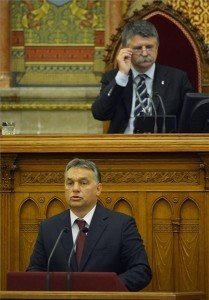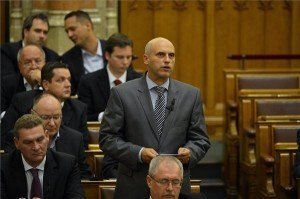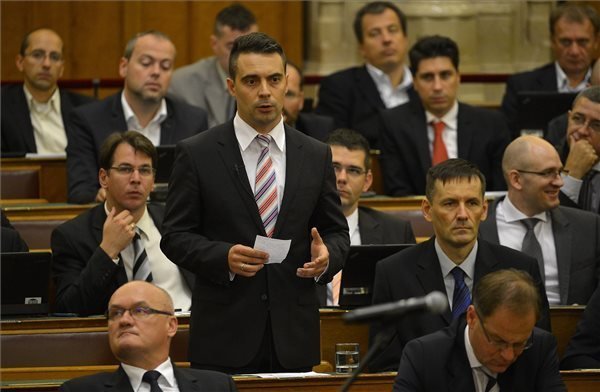(MTI) – The Fidesz-led government’s economic achievements include tax cuts, employment at a 20-year high, a jobless rate below 8 percent, investments up by a fifth in April-June and Hungarian industrial output at a three-year peak, the prime minister told lawmakers in his opening speech of the first day of the autumn session of parliament on Monday.
 By the end of this government’s cycle, Hungary can realistically expect to produce the highest industrial output as a ratio of GDP in Europe, Viktor Orban said.
By the end of this government’s cycle, Hungary can realistically expect to produce the highest industrial output as a ratio of GDP in Europe, Viktor Orban said.
The bank settlements law for compensating borrowers whose contracts were unilaterally changed by banks will focus on the ideals of fairness, equitableness and honour, he said, noting the government had accepted the decision of the Kuria, the supreme court, declaring unilateral changes by banks an unfair practice.
Orban said there is a need to make banks compensate clients in the interest of “the public good”. Banks’ settlements are all about giving “everyone their fair dues,” he said. This can be achieved only by working together, he said. Hungary is now strong enough to enact and enforce the necessary decisions, he added. “By working together, everything is possible,” he said, asking for the support of all lawmakers, irrespective of party colours.
He said there are already “rustles from Brussels,” and banks in themselves are “powerful, brave and cunning,” Orban said, adding the government must be prepared.
The government has been able to make a change in connection with two stressful aspects of everyday life: high utility bills and high repayments on forex loans, the prime minister said. The utility bill cuts administered had a positive impact on the economy, too, Orban said, adding that the scheme was “the essence of our policies” and would continue with a 3.3 percent reduction in district heating prices in October.
Commenting on the partnership agreement Hungary recently signed with the European Commission, he said the document opens “a new era” in Hungary-EU relations, noting that sometimes conflicts are necessary but an agreement without delay is in order when it is in the country’s interests.
Antal Rogan, head of the parliamentary group of the ruling Fidesz party, noted bank settlements involved not only foreign currency borrowers but also forint-denominated ones. “They, too, have a right to fair treatment and must be served justice” he said.
Commenting on criticism over recent police raids of civil groups involved in the disbursement of Norway Grant Funds, Rogan said the law must be observed by everyone and the government would not allow money to be stolen, even if it was from Norway.
Gabor Vona, leader of the radical nationalist Jobbik party, in his response to Orban, said that Jobbik would support the loans settlement law because it sides with people who have suffered losses on their foreign currency loans. Vona added, however, that more details were need to be disclosed about the law, such as what happens regarding evictions already under way.
 Responding to the prime minister’s address, Jozsef Tobias, the group leader of the opposition Socialists, accused the government of ripping off society. He said social disparities had widened since 2010. Serving the “public good”, according to Orban, is abusing the poor and intimidating NGOs. It does not want social harmony but a permanent fight, Tobias added.
Responding to the prime minister’s address, Jozsef Tobias, the group leader of the opposition Socialists, accused the government of ripping off society. He said social disparities had widened since 2010. Serving the “public good”, according to Orban, is abusing the poor and intimidating NGOs. It does not want social harmony but a permanent fight, Tobias added.
Tobias proposed establishing parliamentary sub-committees tasked with scrutinise the government’s performance during the 2010-2014 period, focusing on health-care and public-procurement measures.
The opposition E-PM party alliance said the government had been promising to resolve the forex problem for five years but any actual settlement had always been put off. Speaking on behalf of E-PM, Zsuzsanna Szelenyi, who sits as an independent deputy, told reporters that the government is “trapped” by the forex issue. She noted that in August the government had promised settlement by the autumn, while “Orban is now talking about spring”.
“The whole thing is just an excuse for the government to incite hatred against the banks and make fun of their vulnerable clients,” she said.
E-PM proposes that the government, borrowers and the banks should take an equal share in resolving the forex issue, Szelenyi said.
Lawmakers of the opposition Democratic Coalition (DK) will stay away from the parliamentary debate and vote on the bill for bank settlements on forex loans, Zsolt Greczy, the party’s spokesman, said. He added in a statement that the forex loan proposal is “most certainly unconstitutional” and the government is now seeking to find an “unconstitutional remedy to a problem it itself created.”
Photo: MTI – Tibor Illyes
